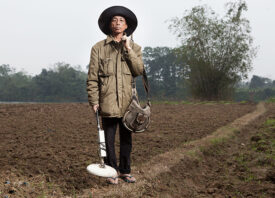Search this site
Unseen Photos of the Vietnam War, Taken By Veterans

Dennis Thornton served in the First Air Cavalry division of the United States Army. He served a few miles north of Saigon between 1969-70. He spent most of his 14 month tour in country working on the division newspaper and magazine. In addition he spent a few months on temporary duty with U.S. Stars and Stripes based in Saigon, getting around the country on assignments.

© Dennis Thornton
“These images usually sit in a box untouched or viewed,” says photo editor Kendra Rennick, who has spent hours poring over and dusting off the slides that lie tucked away, hidden somewhere in the houses of Vietnam War Veterans. These images are the ones the photojournalists missed, the ones that never made it to the Associated Press; they’re the pictures soldiers took while overseas, palling around with one another and venturing into the neighborhoods that surrounded them.
It all started with one man, a veteran who recently passed away. His daughter, a friend of Rennick, confided that her father never discussed the war; he had come home with Post Traumatic Stress Disorder. Still, after his death, she discovered the slides he kept, a box filled with stories she’d never been told.
“There are so many memories that have never been told because of the way media and even the government viewed this conflict,” explains the photo editor, who has reached out to veterans and their families to put together The Vietnam Slide Project. She usually receives a shipment of slides, many of which have not been viewed for decades, before carefully examining and editing her finds.
She’s looking for images that capture a different side of the war. Of her collaborators, she stresses, “each one is a person as well as a soldier,” and indeed, her collection reveals something curious and searching— innocent, even—about the men who were sent to Vietnam. “They were simply young men in a foreign country,” elaborates Rennick, “It appears these Veterans had never been abroad before.”
When asked about the friend who started it all, Rennick says she’s grateful for the chance to access a part of her father’s history that sometimes seemed forbidden, but still, she wishes she had seen the slides when her dad was alive. For this reason, The Vietnam Slide Project will incorporate stories told by living veterans. It’s a chance not only for them to be heard after many, many years but also for their families and the people they loved to have a piece of them once they’re gone.
Since embarking on the project, Rennick has been deeply moved by the willingness and openness of those who want to participate. One son of a veteran who’d died from Parkinson’s disease, a result of Agent Orange, made contact with her in hopes of learning more about his father.
“Several veterans came home and never told their stories,” says Rennick, and now, more than forty years since the end of the war, she’s giving them the chance. The Vietnam Slide Project is ongoing, and Rennick continues to seek veterans and relatives interested in participating.

© Sgt. C.R. Foster, ‘B’ Battery 1st LAAM Marines, 1968

© Dennis Thornton

© Sgt. C.R. Foster, ‘B’ Battery 1st LAAM Marines, 1968


© P. Maney

© P. Maney

© P. Maney

© Dennis Thornton

© Dennis Thornton

© P. Maney

© P. Maney



